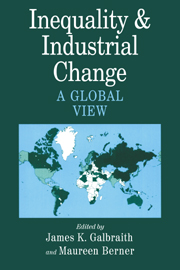Book contents
- Frontmatter
- Contents
- Contributors
- Permissions
- Acknowledgments
- PART I INTRODUCTION TO THEORY AND METHOD
- PART II INEQUALITY, UNEMPLOYMENT, AND INDUSTRIAL CHANGE
- PART III INEQUALITY AND DEVELOPMENT
- 7 Toward a New Kuznets Hypothesis: Theory and Evidence on Growth and Inequality
- 8 Measuring the Evolution of Inequality in the Global Economy
- 9 Economic Regionalization, Inequality, and Financial Crises
- 10 Inequality and State Violence: A Short Report
- 11 Grading the Performance of Latin American Regimes, 1970–1995
- 12 The Evolution of Industrial Earnings Inequality in Mexico and Brazil
- 13 The Legacy of the HCI: An Empirical Analysis of Korean Industrial Policy
- 14 Inequality and Economic Development: Concluding Reflections
- PART IV METHODS AND TECHNIQUES
- Data Appendix
- References and Selected Bibliography
- Index
9 - Economic Regionalization, Inequality, and Financial Crises
Published online by Cambridge University Press: 05 June 2012
- Frontmatter
- Contents
- Contributors
- Permissions
- Acknowledgments
- PART I INTRODUCTION TO THEORY AND METHOD
- PART II INEQUALITY, UNEMPLOYMENT, AND INDUSTRIAL CHANGE
- PART III INEQUALITY AND DEVELOPMENT
- 7 Toward a New Kuznets Hypothesis: Theory and Evidence on Growth and Inequality
- 8 Measuring the Evolution of Inequality in the Global Economy
- 9 Economic Regionalization, Inequality, and Financial Crises
- 10 Inequality and State Violence: A Short Report
- 11 Grading the Performance of Latin American Regimes, 1970–1995
- 12 The Evolution of Industrial Earnings Inequality in Mexico and Brazil
- 13 The Legacy of the HCI: An Empirical Analysis of Korean Industrial Policy
- 14 Inequality and Economic Development: Concluding Reflections
- PART IV METHODS AND TECHNIQUES
- Data Appendix
- References and Selected Bibliography
- Index
Summary
In this chapter, we examine the comovement of macroeconomic variables, similarities, and dissimilarities of industrial structure, as well as patterns of similarity and dissimilarity in the movement of inequality in manufacturing earnings. This information can illuminate the degree of economic integration across countries in a region, and it can highlight important differences between Europe and Asia. We then examine the relationship between financial crisis and the movement of inequality. We show that crises typically generate increases in inequality, but more so in less developed countries and more so in regions that are more liberal in their policy regimes.
Introduction
In this short chapter, we examine the comovement of macroeconomic variables, similarities and dissimilarities in industrial structure, and the movement of inequality in manufacturing earnings, on which we have annual information for much of the global economy over the past thirty years. We argue that this information can illuminate the degree of economic integration across countries in a region and that it can highlight important differences between Europe and Asia. We then examine the relationship between financial crisis and the movement of inequality.
Macroeconomic Comovement and Regionalization
Was there an Asian crisis? Or again, was there an Asian crisis? Was the financial crisis that swept across the Pacific Rim in the summer of 1997, with a cascade of stock market crashes, currency devaluations, and regime changes, notably in Indonesia, specifically Asian, reflecting distinctive characteristics of the Asian region?
- Type
- Chapter
- Information
- Inequality and Industrial ChangeA Global View, pp. 186 - 201Publisher: Cambridge University PressPrint publication year: 2001
- 1
- Cited by



